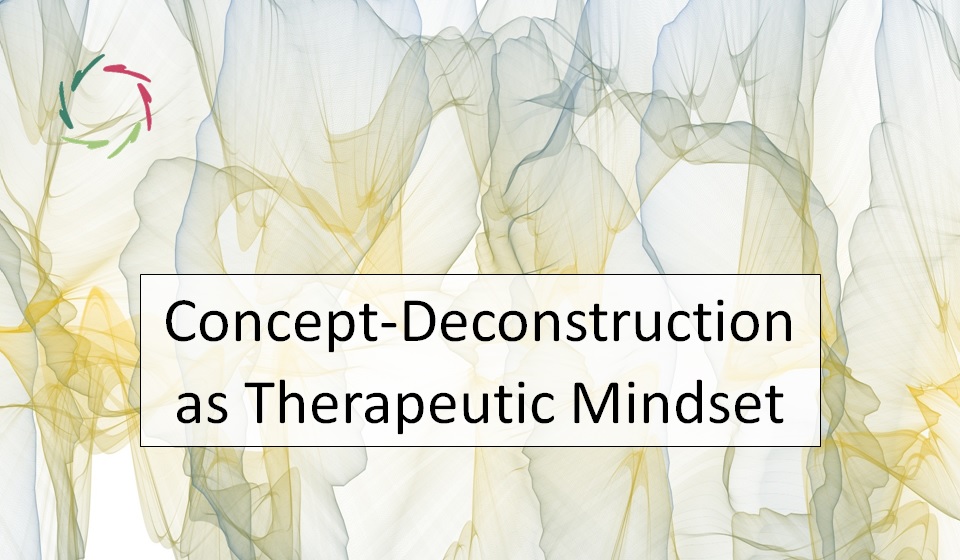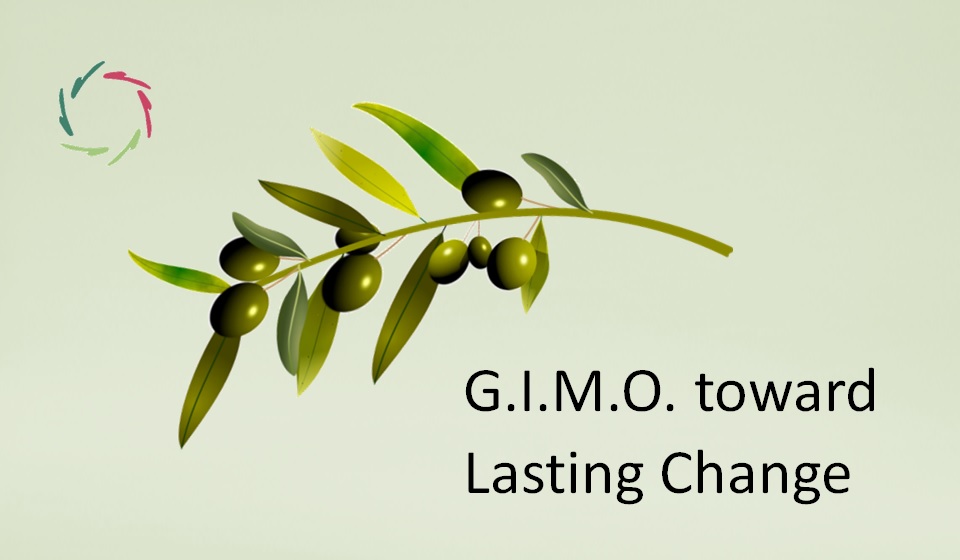Concept-Deconstruction as Therapeutic Mindset

Meant here is the deconstruction of concepts through being critical about the meaning of concept-denoting terms in a way that the subconceptual becomes more apparent.
See: conceptual, subconceptual.
Technique or mindset?
As a technique, this constructive deconstruction might be one that transcends (deconstructs) techniques themselves.
Even so, it’s better not to see it as a technique but a mindset: to invite deconstruction within the client from the inside out.
Deconstruction is the natural consequence of finding depth
It naturally happens when one comes closer to concepts or to oneself. Distance rather shows the bigger picture without intimate details. Coming closer, the details may start showing that there is also something lying behind ― even behind the behind.
Getting there, depth reveals itself.
This may be scary to people.
It may make one anxious who isn’t used to encountering depth within himself or even tries to run away from it. The more one lives in an innerly dissociated state, the more anxiety may be provoked by experiencing depth inside oneself ― as the unknown, thereby uncontrollable. Coming from inside by itself doesn’t make it less scary.
This is what C.G. Jung called one’s ‘shadow,’ pointing to the importance of integrating the same towards what he called ‘individuation.’
Yet, everywhere
Deconstructing concepts shows that this behind-the-veil is not seldom. It can be found all over the place. Depth is everywhere. The term constructionism is used to denote that almost any concept can be seen as a construction that starts from something more fundamental. As a matter of fact, the human brain is illuminating in this, especially at the level of mental-neuronal patterns.
As a stark sociocultural example, is abortion the killing of babies or an act of healthcare and women’s free choice? Then, one can delve into the meaning of these terms/concepts: killing, babies, healthcare, and free choice ― finding layers of depth in any of them, thereby gradually transcending conceptual definitions.
As a coach, one needs to take care not to overwhelm any coachee with his own depth. One should not exaggerate in trying to constructively deconstruct every possible concept. Conversely, the exercise is interesting and may occasionally even be necessary for healing / personal growth.
Deconstruction should never be imposed. It should always be present as a mindset and an invitation. It is thereby compatible with a mindset of autosuggestion.
Lisa
Both ‘mindsets’ can be practically realized by/through Lisa, probably at least as well as by a human coach/therapist. Engrained in Lisa must therefore be the possibility to cope with a small degree of shadowy anxiety in the user or to know when to refer the user to human support.
Much attention goes to this, especially with users who initially show a certain degree of free-floating anxiety.
Relaxing the purely conceptual
This sounds less dramatic ― as it is in almost any case.
Relaxing the conceptual is a kind of diminishing inner dissociation. It brings the user closer to his Inner Strength.
Inviting the user from the inside out toward this by relaxing the conceptual is congruent with the AURELIS project as a whole. It is all contained in the name itself: AU-REL-IS.
Socrates
The above may remind one of the Socratic method – through Socratic dialogue – of de- and re-constructing what the other person initially thought to be certain of. Time and again, Socrates showed that the other person knew less than he – somewhat arrogantly, in many cases – thought before starting the dialogue.
Socrates’ admonition was to ‘know thyself.’ That is very much to the point. I would add one element: “Know thy total self” ― conceptually and subconceptually, at least each coaching a bit more.
Integration through relaxation
Relaxation is a worthy goal by itself. As Socrates already put his finger on, Inner Strength (the potential of his ‘daimoon’) is optimally reached through a subsequent integration that is more constructive and more congruent with the user as a total person.
Many people are stuck in some inner mind configuration for a long time ― even lifelong. Many psychological problems – even major ones such as intense addictions, depression, or schizophrenia – may be seen as stemming from this directly or from desperately trying to get beyond it, thereby starting a never-ending self-enhancing fight with oneself.
Re-integration may and should help in this.
Ideally, this happens when the problems aren’t too big already. We now know that many deeply psychological problems start at a relatively young age. Many of these youngster do not get proper help for one reason or another.
Here also lies an opportunity for Lisa, for sure.


